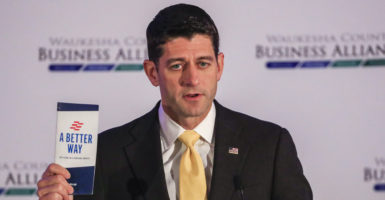House Republicans unanimously backed Rep. Paul Ryan for another term as House speaker in a closed-door meeting Tuesday, with GOP lawmakers signaling they’re putting aside their differences in favor of a “unified Republican government.”
Despite there being skepticism as to whether Ryan would keep his post, the Wisconsin Republican ran unopposed. Reps. Mick Mulvaney, R-S.C., Chris Collins, R-N.Y., and Martha McSally, R-Ariz., nominated Ryan.
“Welcome to the dawn of a new unified Republican government,” Ryan told reporters hours before the conference election.
The full House will vote for speaker when the 115th Congress convenes in January, and Ryan is expected to secure the 218 votes he needs to continue serving as the third most powerful person in Washington.
In addition to Ryan, House Republicans also unanimously re-elected:
- Rep. Kevin McCarthy of California as majority leader,
- Rep. Steve Scalise of Louisiana as majority whip,
- Rep. Cathy McMorris Rodgers of Washington as chair of the Republican conference, and
- Rep. Luke Messer of Indiana as chair of the House Republican Policy Committee
Rep. Steve Stivers of Ohio will helm the National Republican Congressional Committee, beating out Rep. Roger Williams of Texas for the job.
Georgia Rep. Doug Collins won the role of conference vice chairman over Texas Rep. Bill Flores, and Rep. Jason Smith of Missouri will serve as the conference secretary.
Before House Republicans gathered behind closed doors this morning, Ryan sent his colleagues a letter Monday asking for their support and telling them it’s time to “come together like never before.”
“It’s time to go big,” Ryan wrote in the letter. “We have an historic opportunity to turn President-elect [Donald] Trump’s extraordinary victory into progress for the American people.”
The Janesville, Wisconsin, native was first elected speaker last year after then-House Speaker John Boehner suddenly resigned, a move that was triggered, in part, by the House Freedom Caucus.
In the weeks leading up to the conference’s leadership elections, there was speculation that some conservative lawmakers would revolt against Ryan, especially if Trump urged House Republicans to nominate a new leader.
Trump’s relationship with the House speaker was lukewarm during the campaign, where the president-elect called Ryan a “weak and ineffective leader,” and Ryan distanced himself from the Republican presidential nominee.
But a meeting last week between the new president and the House speaker, as well as Vice President-elect Mike Pence and future first lady Melania Trump, suggested the two had put their differences behind them.
Ryan, 46, told reporters he and Trump had a “fantastic, productive meeting,” and the president-elect stressed that he and the Republican conference were ready to begin tackling many of the issues that resonated throughout Trump’s campaign.
“We can’t get started fast enough,” Trump said after the meeting. “And whether it’s health care or immigration, so many different things, we will be working on them very rapidly.”
Though Ryan easily won the nomination for the speakership in today’s closed-door meeting, the weeks leading up to the conference elections proved to be contentious.
Even heading into Tuesday’s elections, some conservatives weren’t entirely at ease with Ryan.
“Our goal is to be unified, right? What we’re asking the leadership to tell us is what they’re going to do different to unify us,” Rep. Raúl Labrador, R-Idaho, told reporters as he headed into the meeting. “ … So I’m trying to hear from my leadership, and I still haven’t, what exactly they’re going to do that is different.”
Labrador, a founding member of the House Freedom Caucus, said he and other members still have process issues they feel need to be addressed, though he remained optimistic that leadership would hear his concerns before the full House votes for speaker in January.
“I want Donald Trump to be successful. I want Paul Ryan to be successful. I want our entire Republican leadership to be successful,” Labrador said. “There are some really good things that are going to happen because of Donald Trump’s election and because we kept a majority in the House and the Senate.”
“I think it’s fantastic. It’s a new day, and I think that’s really good,” he continued. “But I think we would be making a big mistake if we didn’t reflect on the message that the American people sent us over the last few weeks.”
In addition to facing skepticism from the GOP’s conservative wing, Rep. Jim Renacci, R-Ohio, a centrist Republican, pushed for a delay of the leadership elections.
“There are fractures in the conference which truly need to be discussed, vetted, and healed,” Renacci wrote in a letter he circulated to his Republican colleagues. “Asking members to vote for a leadership team within 24 hours of their return to Washington without time to reflect on ways of coming together as a conference is truly ill-advised.”
Additionally, Reps. Jim Bridenstine, R-Okla., and Thomas Massie, R-Ky., said weeks before Tuesday’s speaker vote they wouldn’t support Ryan.
“It would be very difficult for him to get my vote based on what I assume his motives are, which are to run for president in 2020,” Massie told The Huffington Post earlier this month.
But Trump’s election to the presidency—he’ll be sworn in Jan. 20—appeared to stir up feelings of unity among the otherwise divided Republican conference.
In an interview with CNN on Monday, Rep. Mark Meadows, R-N.C., said the House Freedom Caucus was focusing on passing conservative policies during the first 100 days of Trump’s administration.
“The focus is really not on the speaker’s race any longer,” he said. “It’s on the American people and making sure that we actually take Washington, D.C., back, give it back to its rightful owner, the American people. We’re more focused on the first 100 days.”
But the North Carolina Republican, who filed the motion to vacate the chair to oust Boehner last year, told Politico last week he and his Freedom Caucus colleagues will be watching the actions of GOP leadership closely.
“If there is any impediment to accomplishing what President-elect Trump and Vice President-elect Mike Pence want to accomplish in the first 100 days, there will be a number of us in the [House Freedom Caucus] and outside the [House Freedom Caucus] who are willing to say, ‘Wait a minute,’” Meadows said.
This article has been updated to include additional information.

























